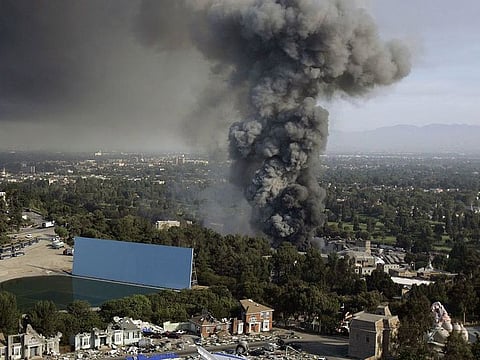Lawsuits against Universal Music Group expected in response to fire
A massive number of original master recordings were destroyed in a 2008 fire

A high-profile Los Angeles law firm representing multiple recording artists plans to file legal action as early as next week in response to news that a massive number of original master recordings were destroyed in a 2008 fire at Universal Studios Hollywood.
“We have many very concerned clients,” attorney Howard King, partner in King, Holmes, Paterno & Soriano, said. “This has a potentially huge impact on their future, coupled with the rather disturbing fact that no one ever told them that their intellectual property may have been destroyed. There is a significant amount of discussion going on, and there will be formal action taken.”
King declined to identify specific artists signed to Universal Music Group labels whose master recordings may have been destroyed, according to a blockbuster investigation published by the New York Times Magazine, but said that, “more than 10 but fewer than 100 clients” would be seeking legal redress, noting the fast-moving response after the extent of the fire damage came to light.
The total number of master recordings lost in the fire could run as high as 500,000 recordings, the report said. Only a fraction of the original masters held in the facility were adequately copied, the story said, resulting in the loss of irreplaceable original masters by Louis Armstrong, Billie Holiday, Aretha Franklin, Chuck Berry, Buddy Holly, the Eagles, Elton John, Tom Petty & the Heartbreakers, Duke Ellington, Count Basie, Ella Fitzgerald, Muddy Waters, Judy Garland, Patsy Cline, Bing Crosby and dozens, if not hundreds, perhaps thousands, of other recording artists.
Original master recordings are the source material for commercially released versions that are sold, downloaded or streamed by consumers. They are typically the wellspring from which remastered or remixed reissues, box sets and other archival releases originate year in and year out, decade after decade.
Universal Music Group, or UMG, is the world’s largest recorded-music company.
UMG took issue with the New York Times Magazine story, citing “numerous inaccuracies, misleading statements, contradictions and fundamental misunderstandings of the scope of the incident and affected assets.”
The company’s statement insisted, “Music preservation is of the highest priority for us and we are proud of our track record. While there are constraints preventing us from publicly addressing some of the details of the fire that occurred at NBC Universal Studios facility more than a decade ago, the incident — while deeply unfortunate — never affected the availability of the commercially released music nor impacted artists’ compensation.”
A UMG spokesman said that the company has no comment on the proposed lawsuits.
A fire on June 1, 2008, decimated a storage facility owned by NBCUniversal on the grounds of Universal Studios Hollywood; various clients rented space in the building for film and audio recordings.
At the time of the fire, facility officials said only copies of films had been kept there, and a Universal Music Group spokesman told The Times in the aftermath of the fire that “in a sense, nothing was lost,” because materials had been backed up with digitised copies.
King said he expected to file individual lawsuits on behalf of clients rather than class-action suits.



